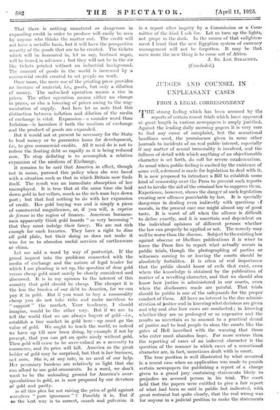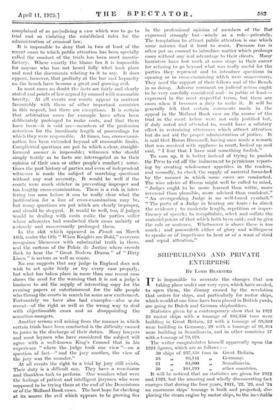JUDGES A ND COUNSEL IN UNPLEASANT CASES
FROM A LEGAL CORRESPONDENT THE strong feeling which has bcen aroused by the reports of certain recent trials which have appeared at great length in various newspapers is amply justified. Against the leading daily morning papers it is very rare to find any cause of complaint, but the sensational headlines used, the prominence given in some other journals to incidents of no real public interest, especially if any matter of sexual immorality is involved, and the fullness of detail with which anything of an objectionable character is set forth, do call for severe condemnation. As usual when public feeling is excited by the existence of some evil, a demand is made for legislation to deal with it. It is now proposed to introduce a Bill to establish some kind of censorship over the Press to prevent such reports and to invoke the aid of the criminal law to suppress them. Experience, however, shows the danger of such legislation creating new offences punishable by law. It is specially dangerous in dealing even indirectly with question,s c f morals, in the present case one might almost say of good taste. It is worst of all when the offence is difficult to define exactly, and it is uncertain and dependent on the individual opinions of different persons whether the law can properly be applied or not. The remedy may well be worse than the disease. Subject to the existing law against obscene or libellous publications it is wiser to leave the Press free to report what actually occurs in public trials, though the photographing of parties or witnesses coming to or leaving the courts should be absolutely forbidden. It is often of real importance that the public should know of evils that exist, even where the knowledge is obtained by the publication of matter of a revolting character, and that we should also know how justice is administered in our courts, even when the disclosures made are painful. That trials should be public is one of the safeguards for the proper conduct of them. All have an interest in the due admini- stration of justice and in knowing what decisions are given and why and also how cases are conducted ; in knowing whether they are so prolonged or so expensive and the results so uncertain as to amount to a practical denial of justice and to lead people to shun the courts like the (Yates of Hell inscribed with the warning that those who enter must abandon hope. Far more serious than the reporting of cases of an indecent character is the question of the manner in which cases of a sensational character are, in fact, sometimes dealt with in court.
The true position is well illustrated by what occurred in a recent case when an application was made to punish certain newspapers for publishing a report of a charge given to a grand jury containing statements likely to prejudice an accused person in his trial. The court held that the papers were entitled to give a fair report of what had been so said in public but indicated, with great restraint but quite clearly, that the real wrong was for anyone in a judicial position to make the statements complained of as prejudicing a case which was to go to trial and so violating the established rules for the administration of criminal law.
It is impossible to deny that in two at least of the recent cases to which public attention has been specially called the conduct of the trials has been most unsatis- factory. Where exactly the blame lies it is impossible for anyone who has not heard fully what took place and read the documents relating to it to say. It does appear, however, that prolixity at the bar and loquacity on the bench have become a great and growing evil.
In most cases no doubt the facts are fairly and clearly stated and points of law argued by counsel with reasonable brevity. At all events our courts appear to contrast favourably with those of other important countries in this respect, but there are exceptions. It is certain that arbitration cases for example have often been deliberately prolonged to make costs, and that there have been—it is said are—members of the profession notorious for the inordinate length of proceedings for which they were responsible. At times, too, cross-exami- nation has been extended beyond all reasonable limits. Complicated questions are put to which a clear, straight- forward answer is impossible; witnesses who should simply testify as to facts are interrogated as to their opinion of their own or other people's conduct ; some- times the past history of parties and even of independent witnesses is made the subject of searching questions without any real necessity. It would be well if the courts were much stricter in preventing improper and too lengthy cross-examination. There is a risk in inter- fering too soon before it can be really clear what the justification for a line of cross-examination may be, but many questions are put which are clearly improper, and should be stopped. It would be well, too, if judges would in dealing with costs make the parties suffer whose advocates had conducted their cases unfairly or seriously and unnecessarily prolonged them.
In the skit which appeared in Punch on March 18th, under the title " When Knights are Bold," everyone recognizes likenesses with substantial truth in them, and the cartoon of the Palais de Justice where crowds flock to hear the " Great Modern Drama " of " Dirty Linen " is serious as well as comic.
No one suggests that any judge in England does not wish to act quite fairly or try every case properly, but what has taken, place in more than one recent case shows the need for the warning that it is not a judge's business to aid the supply of interesting copy for the evening papers or entertainment for the idle people who throng the courts in search for some new excitement. Fortunately we have also had examples—also qiiite recent—of the right as well as the wrong way to deal with objectionable cases and so disappointing the sensation-mongers.
Another serious evil arising from the manner in which certain trials have been conducted is the difficulty caused to juries in the discharge of their duties. Many lawyers and most laymen who have considered the subject will agree with a well-known King's Counsel that in his experience " where the judge took one view "—on a question of fact—" and the jury another, the view of the jury was the sounder."
At all events the right to a trial by jury still exists. Their duty is a difficult one. They have a wearisome and thankless task to perform. One wonders what were the feelings of patient and intelligent jurymen who were supposed to be trying them at the end of the Dennistoun or of the Midland Bank cases. The best hope for checking at its source the evil which appears to be growing lies in the professional opinion of members of the Bar expressed strongly but—wisely as a rule—privately. The temptation to attract public attention is one which some natures find it hard to resist. Pressure too is often put on counsel to introduce matter which prolongs cases without any real advantage to their clients. Many barristers have lost work at some stage in their career for refusing to go beyond what was really useful for the parties they represent and to introduce questions in opening or in cross-examining which were unnecessary. They need the support of their fellows and of the Bench in so doing. Adverse comment on judicial action ought to be very carefully considered and--in public at least-- expressed in the most respectful terms, but there arc cases when it becomes a duty to make it. It will be generally felt that certain comments made in the appeal in the Midland Bank case on the course of the trial in the court below were not only justified but, if duly noted and attended to, would have a salutary effect in restraining utterances which attract attention but do not aid the proper administration of justice. It is said that Baron Bramwell, having once made a remark that was received with applause in court, looked up and said, " I fear that I have said something foolish."
To sum up, it is better instead of trying to punish the Press to cut off the inducement to pernicious report- ing by creating wholesomer appetites in the readers, and secondly, to check the supply of material furnished by the manner in which some cases are conducted. The wise advice of Bacon might well be called to mind, " Judges ought to be more learned than wittie, more reverend than plausible, more advised than confident." " An overspeaking Judge is no well-tuned cymball." " The parts of a Judge in hearing are foure : to direct the evidence ; to moderate length, repetition or imper- tinency of speech ; to recapitulate, select and collate the material points of that which hath been said ; and to give the rule or sentence. Whatsoever is above these is too much ; and proceedeth either of glory and willingness to speake or of impatience to hear or of a want of staid and equal attention."











































 Previous page
Previous page